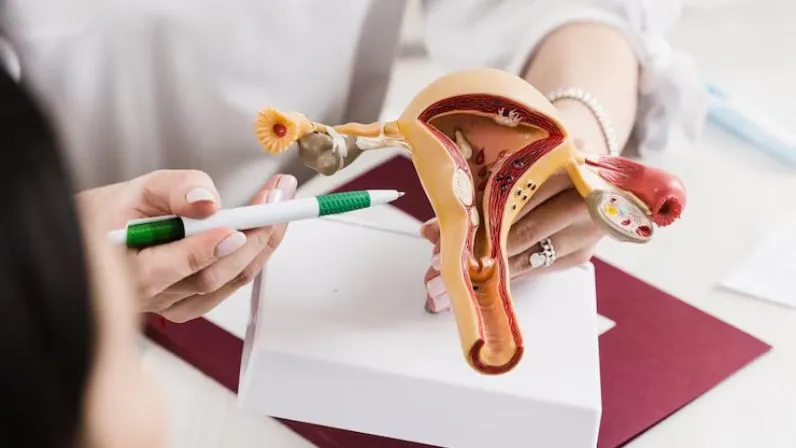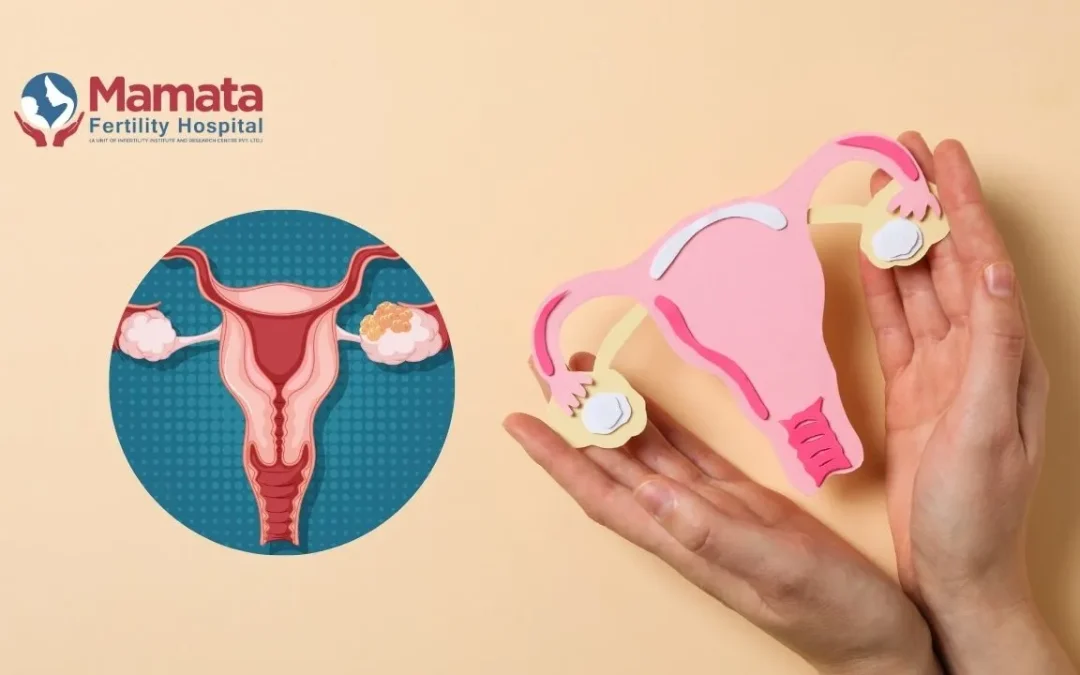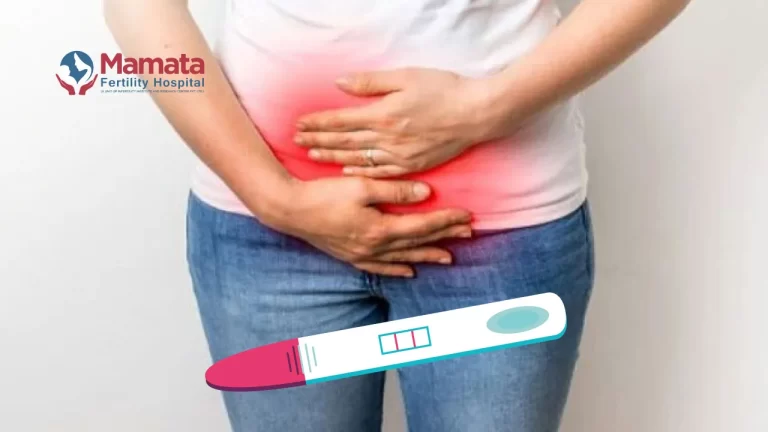Ovarian Polyps
At Mamata Fertility Hospital in Secunderabad, we’re here to simplify complex medical topics and guide you toward better health.
If you’ve heard about ovarian polyps and are wondering what they mean for your well-being or family planning, this guide will help you understand the condition, its effects, and the treatments available.
For Appointments, Please Call:
More On PCOD/PCOS
What are Ovarian Polyps?
Ovarian polyps, sometimes confused with ovarian cysts, are small growths that develop on or within the ovaries. Think of them as tiny, mushroom-like structures attached to the ovary. While cysts are fluid-filled sacs, polyps are more solid and often form due to abnormal tissue growth.
Most ovarian polyps are benign, meaning they’re not cancerous, and they often don’t cause any problems. However, in some cases, they might lead to symptoms, especially if they grow large. Rarely, these growths may require further evaluation to rule out cancer.
Ovarian polyps are less common than their counterpart, uterine polyps. Understanding their causes, symptoms, and treatment options is key to managing your reproductive health.

Causes and Risk Factors
Why Do Ovarian Polyps Form?
While the exact reasons aren’t always clear, several factors might contribute to the formation of ovarian polyps, including:
- Hormonal Imbalances:
- Fluctuations in hormones like estrogen may trigger abnormal tissue growth in the ovaries, leading to polyps.
- Chronic Inflammation:
- Ongoing inflammation in the pelvic area or ovaries can create an environment that promotes the development of polyps.
- Genetic Factors:
- A family history of ovarian growths or cancers might increase your likelihood of developing ovarian polyps.
- Underlying Health Conditions:
- Conditions like Polycystic Ovary Syndrome (PCOS) or endometriosis sometimes correlate with the presence of abnormal growths in the ovaries.
Risk Factors
While ovarian polyps can occur at any age, certain factors make them more likely, such as:
- Age: Women in their 40s and 50s are more prone.
- Hormone Therapy: Long-term use of hormone-based medications may increase the risk.
- Reproductive History: Irregular menstrual cycles or issues with ovulation can be a factor.
Symptoms and Diagnosis
What Symptoms Should You Watch For?
Ovarian polyps often don’t show noticeable signs, which means they might go undetected unless discovered during routine medical exams. However, some women may experience the following symptoms.
- Pelvic Pain or Discomfort
- A dull ache or cramp-like feeling in the lower abdomen, especially on one side.
- Irregular Menstrual Cycles
- Periods that are unusually heavy, light, or missed altogether.
- Bloating
- Feeling full or swollen in the abdominal area, which may be more noticeable after eating.
- Difficulty with Bowel or Urinary Functions
- Larger polyps can press on nearby organs, leading to constipation or frequent urination.
If symptoms like these arise, it’s always best to consult with your doctor to determine the cause.
How Are Ovarian Polyps Diagnosed?
At Mamata Fertility Hospital, we use advanced diagnostic tools to detect and evaluate ovarian polyps. Here’s what to expect during your visit:
- Physical Exam:
- A routine pelvic examination may reveal abnormalities that require further testing.
- Ultrasound:
- A transvaginal ultrasound provides a clear image of your ovaries, helping identify polyps or other growths.
- MRI or CT Scan:
- These imaging tests offer a detailed view of the pelvic area, useful for larger or more complex growths.
- Blood Tests:
- If necessary, specific blood tests like CA-125 might be ordered to check for markers associated with ovarian issues.
Early detection is key to managing ovarian polyps and preventing complications.
Treatment and Management Options
Non-Surgical Treatments
For polyps that are small and not causing symptoms, doctors may recommend monitoring instead of immediate treatment. Regular check-ups help ensure that the growth isn’t changing or becoming problematic.
Surgical Treatments
If ovarian polyps need to be removed, there are effective and minimally invasive options available, including:
- Laparoscopy:
- This procedure uses small incisions and a tiny camera to remove the polyp with precision. Most patients recover quickly and return to normal activities within days.
- Laparotomy:
- If the polyp is larger or suspected to be cancerous, this open surgical approach may be used for safe removal and further evaluation.
- Hysteroscopy:
- For polyps in other reproductive areas, such as the uterine lining, hysteroscopy might also be suggested as part of your treatment plan.
Post-Treatment Care
Recovery is usually smooth, with minimal discomfort. Regular follow-ups are essential to monitor for recurrence or any additional concerns.
Lifestyle and Support Recommendations
Even though ovarian polyps can’t always be avoided, certain lifestyle choices support overall reproductive health. Here are some tips:
- Eat a Balanced Diet:
- Include fresh fruits, vegetables, whole grains, and lean protein in your meals to regulate hormones and support tissue health.
- Exercise Regularly:
- Activities like walking, swimming, or yoga help reduce inflammation and maintain a healthy weight.
- Stay Hydrated:
- Drinking ample water aids nutrient absorption and helps maintain overall cellular health.
- Avoid Smoking and Alcohol:
- These habits can negatively impact hormone balance, increasing your risk of various reproductive issues.
- Manage Stress Levels:
- Too much stress can disrupt hormonal function, so find ways to relax through hobbies, meditation, or counseling support.
- Schedule Regular Check-Ups:
- Routine gynecological exams ensure any abnormal growths are detected early.
Ovarian Polyps, Pregnancy & Fertility
When it comes to pregnancy and fertility, ovarian polyps can play a significant role. Understanding their potential impact is essential if you’re trying to conceive or expecting a child.
Do Ovarian Polyps Affect Fertility?
While not all ovarian polyps interfere with conception, some may pose challenges. Here’s how they might impact your chances of becoming pregnant:
- Obstruction:
- Larger polyps could block eggs from releasing or traveling through the fallopian tube, making conception harder.
- Hormonal Imbalances:
- If polyps are tied to elevated estrogen levels, they might disrupt ovulation or other hormonal cycles necessary for pregnancy.
- Inflammation:
- Chronic irritation caused by polyps may affect the uterine or ovarian environment, reducing fertility.
Removing these polyps often restores fertility, especially for women undergoing assisted reproductive techniques like IVF.
Ovarian Polyps During Pregnancy
If you’re already pregnant and diagnosed with ovarian polyps, rest assured that most cases are not harmful. Here’s what you should know:
- Monitoring:
- Doctors may closely monitor the polyp to ensure it doesn’t grow or cause complications.
- Pain or Discomfort:
- Larger polyps might cause mild pain due to the growing uterus.
- Surgery Timing:
- If a polyp must be removed, doctors generally prefer waiting until after delivery unless it poses an immediate threat.
Timely care and monitoring can prevent these growths from interfering with your pregnancy or delivery. At Mamata Fertility Hospital, our specialists offer personalized support for women balancing both polyps and pregnancy.
FAQs
1. Are ovarian polyps cancerous?
Most ovarian polyps are benign and not cancerous, but regular check-ups ensure they remain non-threatening.
2. Can ovarian polyps come back after removal?
Yes, though recurrence is rare. Following a healthy lifestyle and scheduling routine exams can minimize the chances.
3. Will polyps go away on their own?
Some small polyps may resolve naturally, but most require monitoring to confirm they’re not growing or causing issues.
4. Can polyps occur in both ovaries?
Yes, though it’s more common to find polyps in one ovary.
5. Is treatment painful?
Most treatments, especially minimally invasive surgery like laparoscopy, are quick and cause only mild discomfort during recovery.
At Mamata Fertility Hospital, we’re dedicated to guiding you through every step of your health journey.
If you suspect ovarian polyps or have concerns about their impact on pregnancy and fertility, contact us for expert advice and compassionate care. Together, we’ll find the best solution for your needs!
Reviewd By

Dr Aarti Deenadayal Tolani
Clinical Director, Scientific In-Charge & Fertility Consultant
MBBS, MS ( OBGYN), FICOG
Expert in Reproductive Endocrinology, Infertility, Advanced Gynaec Ultrasound, and Faculty at Mamata Fertility Hospital.
Blogs and Articles

PCOD or PCOS which is more dangerous?
PCOD and PCOS are hormonal disorders affecting women’s health. PCOD is milder, while PCOS is more severe and can impact fertility and overall health.

How to Cure PCOD Problem Permanently?
PCOD can’t be permanently cured, but with medical care, diet, exercise, and lifestyle changes, you can manage symptoms and improve hormonal health.

How to Get Pregnant with Endometriosis Naturally?
Get Pregnant with Endometriosis Naturally through diet, lifestyle changes, stress management, and holistic methods. Learn expert tips for a successful pregnancy.

